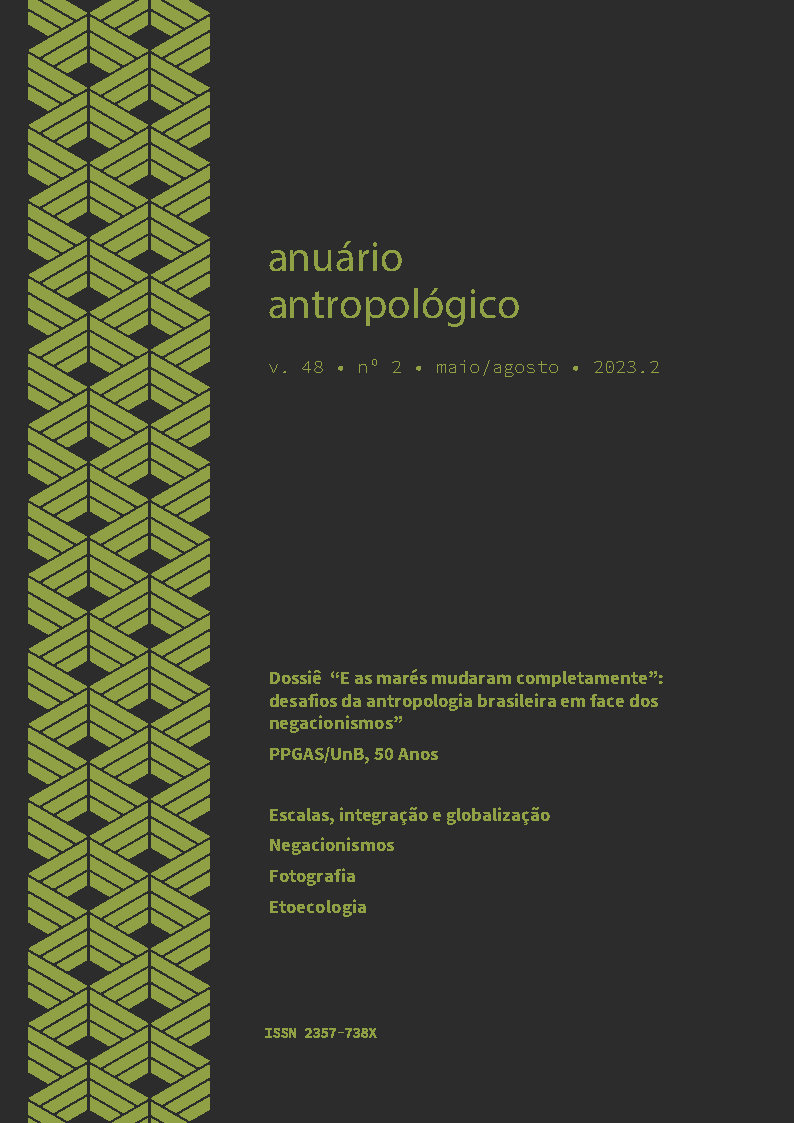They tell us everything they are doing": science and conspiracy in Flat Earth discourses
DOI:
https://doi.org/10.4000/aa.11095Keywords:
flat-earthers, post-truth, conspiracy theories, antiscience, anthropology of scienceAbstract
By analyzing the discourses of flat-earthers, this paper presents the main claims of the movement and discusses the methodological challenges associated to the study of groups which are critical to scientists. Along the description, the paper works with the notion of “hostile empathy” (Bubandt 2009) in two different ways: as the main process through which the flat-earthers create themselves; as a possible methodological strategy to study them.
Downloads
References
Allegro, James. 2017. “The bottom of the universe: Flat earth science in the age of the encounter”. History of Science 55, nº 1: 61–85. DOI : 10.1177/0073275316681799
Abu-lughod, Lila. 2018. “A escrita contra a cultura”. Equatorial: Revista do Programa de Pós-Graduação em Antropologia Social 5, nº 8: 193–226.
Astuti, Rita. 2017. “Taking people seriously”. HAU: Journal of Ethnographic Theory 7, nº 1: 105–22. DOI : 10.14318/hau7.1.012
Almeida, Rafael Antunes Almeida. 2013. “Stories of collaboration, sharing and writing: An anthropologist meets a UFO Researcher”. Comunicação apresentada na 113ª Annual Meeting – American Anthropological Association – Producing Anthropology.
Almeida, Rafael Antunes. 2015. “Objetos intangíveis: Ufologia, ciência e segredo”. Tese de Doutorado. Universidade de Brasília.
Almeida, Rafael Antunes. 2018. Notas para uma reflexão sobre as “teorias da conspiração”. Ponto urbe: Revista do Núcleo de Antropologia Urbana da USP 23: 1–9. DOI : 10.4000/pontourbe.5615
Almeida, Rafael Antunes. 2019. “Antropologia e pós-verdade: Contribuições para uma interpretação do terraplanismo”. Comunicação apresentada na Mesa Redonda “Às voltas com a pós-verdade”: os estudos de ciência em face da ascensão dos "populismos tecnológicos" – VIII Simpósio Nacional de Ciência, Tecnologia e Sociedade.
Almeida, Rafael Antunes. 2020. “UFOS, ufologists and digital media in Brazil”. In Believing in Bits: Digital media and the supernatural, organizado por Simone Natale e Diana Pasulka, 181–94. New York: Oxford University Press. DOI : 10.1093/oso/9780190949983.003.0011
Battaglia, Debbora, e Rafael Antunes Almeida. 2014. “’Otherwise Anthropology’ Otherwise: The View from Technology”. Member Voices, Fieldsights, February 24. https://culanth.org/fieldsights/otherwise-anthropology-otherwise-the-view-from-technology
Bubandt, Nils. 2009. “From the enemy's point of view: Violence, empathy, and the ethnography of fakes”. Cultural Anthropology, 24 nº 3: 553–88.
Bubandt, Nils, e Rane Willerslev. 2015. “The dark side of empathy: Mimesis, deception, and the magic of alterity”. Comparative Studies in Society and History 57 nº 1: 5–34.
Cesarino, Letícia. 2019a. “Populismo digital, neoliberalismo e pós-verdade: Uma explicação cibernética”. Anais da VII Reunião de Antropologia da Ciência e da Tecnologia.
Cesarino, Letícia. 2019b. Pós-verdade: Uma explicação cibernética. (mimeo).
Crapanzano, Vincent. 1985. Waiting: The whites of South Africa. New York: Random House.
Cross, Anne. 2000. “A confederacy of faith and fact: UFO research and the search for other worlds”. Tese de Doutorado. University of Yale.
Dean, Jodi. 2000. “Webs of conspiracy”. In The world wide web and contemporary cultural theory, organizado por A. Herman e T. Swiss, 61–76. New York: Routledge.
Faltay, Paulo. 2019. “Conspiração e engajamento no YouTube: O modelo de negócios paranoide das plataformas”. Medialab, UFRJ. http://medialabufrj.net/blog/2019/10/ dobras-39-conspiracao-e-engajamento-no-youtube-o-modelo-de-negocios-paranoide-das-plataformas/
Ginszburg, Carlo. 1991. Mitos, emblemas e sinais. São Paulo: Companhia das Letras.
Goldman, Márcio. 2014. “Da existência dos Brunos (ou como funciona a antropologia)”. R@U – Revista de Antropologia da UFSCar 6, nº 1: 7–24.
Harding, Susan, e Kathleen Stewart. 2003. “Anxieties of influence: conspiracy theory and therapeutic culture in millennial America”. In Transparency and conspiracy: Ethnographies of suspicion in the new world order, organizado por H. West, e T. Sanders, 258–86. Durham; London: Duke University Press.
Hess, David. 1993. Science in the new age: The paranormal, its defenders and Debunkers, and American Culture. Madison: The University of Wisconsin Press.
Hofstadter, Richard. 1952. The paranoid style in American politics and other essays. Cambridge: Harvard University Press.
Lactâncio. 1964. The Divine Institutes – Books I-VII. Washington: The Catholic University of America Press.
Kalpokas, Ignas. 2019. A political theory of post-truth. Cham: Palgrave Macmillian.
Kuhn, Thomas. 1957. The Copernican Revolution: Planetary astronomy in the development of western thought. Cambridge: Harvard University Press.
Latour, Bruno. 2004. “Why has critique run out of steam? From matters of fact to matters of concern”. Critical Inquiry 30, nº 2: 225–48. DOI : 10.1086/421123
Latour, Bruno. 2005. Reassembling the social. An introduction to actor-network-theory. New York: Oxford University Press.
Merton, Robert. 1968. “Science and democratic social structure”. In Social theory and social structure, organizado por Robert Merton, 604–15. New York: The Free Press.
Peirano, Mariza. 1987. “O encontro etnográfico e o diálogo teórico”. Anuário Antropológico 85: 249–64.
Pelkmans, Mathijs, e Rhys Machod. 2011. “Conspiracy theories and their truth trajectories”. Focaal: Journal of Global and Historical Anthropology 59: 66–80. DOI : 10.3167/fcl.2011.590105
Polino, Camelo, e Yurij Castelfranchi. 2019. “Percepción publica de la ciencia en iberoamerica: Evidencias e desafíos de la agenda de corto prazo”. Revista CTS 42, nº 14: 115–36.
Sá, Guilherme José da Silva, e Almeida, Rafael Antunes. 2020. “O que esperar da ciência enquanto esperamos o amanhã”. In Cientistas Sociais e o Coronavírus, organizado por Miriam Grossi, e Rodrigo Toniol. Florianópolis: Anpocs; Tribo da Ilha.
Spyer, Patricia. 2002.“Fire without smoke and other phantoms of Ambon’s violence: Media effects, agency and the work of imagination”. Indonesia 74: 21–36. DOI : 10.2307/3351523
Srnicek, Nick. 2017. Platform capitalism. Cambridge: Polity Press.
Stengers, Isabelle. 2002. A invenção das ciências modernas. São Paulo: Editora 34.
Trouillot, Michel-Rolph. 2016. Silenciando o passado: O poder e a produção da história. Campinas: Huya.
Vidal-Naquet, Pierre. 1998. Os assassinos da memória: Um Eichmann de papel e outros ensaios sobre o revisionismo. Campinas: Papirus.
Viveiros de Castro, Eduardo. 2002. “O nativo relativo”. Mana 8, nº 1: 113–48. DOI : 10.1590/S0104-93132002000100005
York, Alex. 2017. American Flat Earth Theory: Anti-Intellectualism, Fundamentalism and Conspiracy Theory. History Undergraduate Publications and Presentations, v. 3.
Downloads
Published
Issue
Section
License
Copyright (c) 2023 Anuário Antropológico

This work is licensed under a Creative Commons Attribution-NonCommercial-NoDerivatives 4.0 International License.
https://creativecommons.org/licenses/by/4.0/legalcode.en
Creative Commons - Atribución- 4.0 Internacional - CC BY 4.0
https://creativecommons.org/licenses/by/4.0/legalcode.en



